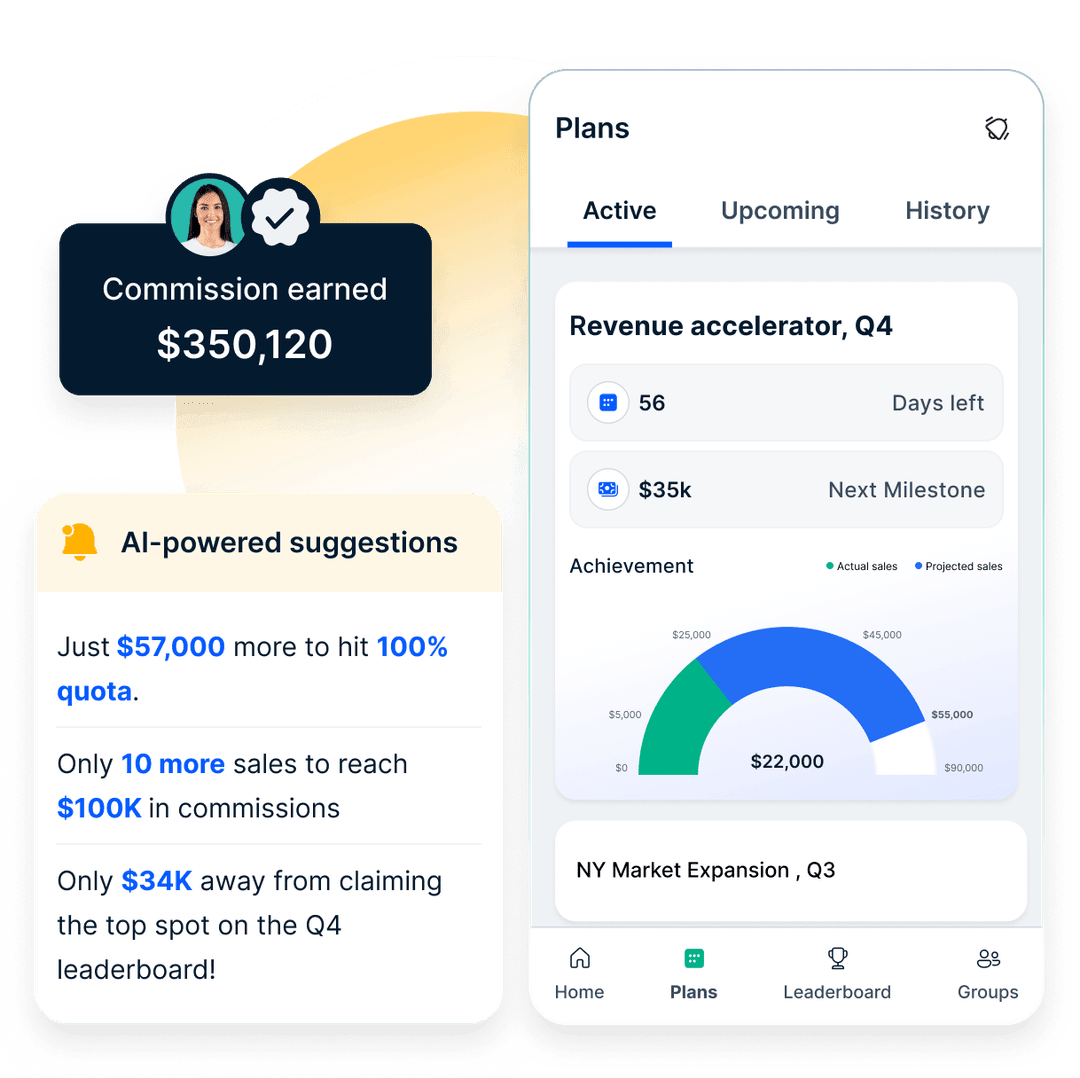Cara Mengurus Pasukan Jualan dan Meningkatkan Produktiviti: 10 Strategi Berkesan
Pengurusan pasukan jualan yang berkesan memacu prestasi dan kejayaan jangka panjang. Daripada menetapkan matlamat yang jelas kepada bimbingan dan motivasi, memahami cara menguruskan pasukan jualan boleh membuat semua perbezaan.
Pada halaman ini
Menurut laporan strategi & aliran jualan HubSpot 2023 , 41% wakil jualan melepasi matlamat mereka, manakala 41% lagi mencapai matlamat mereka. Walau bagaimanapun, 18% berprestasi rendah, menonjolkan kepentingan pengurusan pasukan jualan yang diterajui oleh kepimpinan dipacu data.
Menguruskan pasukan jualan melibatkan metrik penjejakan, memenuhi kuota, wakil bimbingan dan mengekalkan semangat. Laporan Gartner mendapati bahawa 72% daripada pemimpin jualan berprestasi tinggi mengutamakan penambahbaikan proses dan kerjasama pasukan. Selain itu, 65% pemimpin jualan yang melabur dalam pembolehan jualan melaporkan melebihi sasaran mereka.
Menguruskan pasukan jualan dengan berkesan sambil memenuhi jangkaan syarikat memerlukan usaha strategik. Kajian Gartner juga mendedahkan bahawa 61% daripada ketua pegawai jualan melihat peningkatan keberkesanan pengurus jualan sebagai keutamaan utama. Sama ada anda seorang pemimpin baharu atau pengurus yang berpengalaman, memahami cara mengurus pasukan jualan adalah kunci untuk memacu kejayaan.
Mari kita terokai amalan terbaik untuk membina dan mengurus pasukan jualan berprestasi tinggi.
Mengapa pengurusan pasukan jualan yang baik penting?
Pengurusan pasukan jualan yang berkesan memacu hasil, mengekalkan motivasi dan memastikan pertumbuhan perniagaan jangka panjang. Pasukan jualan yang diurus dengan baik bukan sahaja memenuhi sasaran tetapi juga memupuk budaya akauntabiliti, kerjasama dan peningkatan berterusan. Inilah sebabnya pengurusan pasukan jualan yang kukuh penting:
1. Meningkatkan produktiviti dan kecekapan
Pendekatan berstruktur kepada pengurusan jualan membantu wakil kekal fokus pada tugas keutamaan tinggi, mengurangkan masa yang terbuang dan meningkatkan kecekapan keseluruhan. Matlamat yang jelas, proses yang ditakrifkan dengan baik dan aliran kerja yang diperkemas memastikan bahawa setiap usaha menyumbang kepada penutupan tawaran.
2. Meningkatkan prestasi jualan
Pengurusan yang baik memastikan setiap jurujual menerima latihan, alatan dan sokongan yang betul untuk melakukan yang terbaik. Bimbingan, maklum balas dan ulasan prestasi yang kerap membantu wakil memperhalusi strategi mereka, mengendalikan bantahan dengan berkesan dan menutup lebih banyak tawaran.
3. Mengukuhkan kerjasama pasukan
Pasukan jualan yang diurus dengan baik bekerjasama, berkongsi pandangan dan menyokong satu sama lain. Kerjasama antara wakil jualan dan jabatan lain seperti pemasaran dan sokongan pelanggan membawa kepada pengalaman pelanggan dan hasil perniagaan yang lebih baik.
4. Meningkatkan pengekalan pekerja
Persekitaran kerja yang positif dengan jangkaan yang jelas, insentif yang adil dan peluang pertumbuhan melibatkan profesional jualan. Pusing ganti yang tinggi boleh mengganggu momentum jualan, tetapi kepimpinan yang kukuh memupuk kesetiaan dan mengurangkan pergeseran.
5. Meningkatkan hubungan pelanggan
Pengurusan yang baik memastikan wakil jualan membina kepercayaan pelanggan, menumpukan pada hubungan jangka panjang dan menyediakan penyelesaian dan bukannya hanya membuat jualan. Pendekatan berpusatkan pelanggan membawa kepada perniagaan berulang dan nilai seumur hidup yang lebih tinggi.
Pengurusan jualan yang baik bukan hanya tentang mencapai sasaran—ia mengenai membina pasukan berprestasi tinggi, bermotivasi dan berdaya tahan yang memacu kejayaan perniagaan yang mampan.
Faedah mempunyai pasukan jualan yang berdedikasi
Pasukan jualan adalah penting untuk perniagaan yang ingin berkembang maju.
- Pasukan jualan yang berdedikasi boleh mempengaruhi perniagaan anda, daripada mengenali petunjuk kepada membangunkan hubungan pelanggan kepada mempromosikan kebolehpercayaan dan pengekalan.
- Pasukan jualan yang baik membentuk tulang belakang organisasi untuk kekal berdaya saing. Mereka menawarkan maklumat yang tidak ternilai tentang trend dan kecenderungan pelanggan untuk memprogramkan kempen pemasaran untuk mendapatkan hasil yang pantas.
- Perbelanjaan dalam tenaga jualan yang kukuh memastikan perniagaan kekal berdaya saing dengan memperoleh data pelanggan yang dihargai, membangunkan hubungan dengan prospek, meningkatkan kadar penukaran petunjuk, dsb.
Mengekalkan faedah pasukan jualan yang berdedikasi ini, jelas mengapa melantik pasukan jualan yang berdedikasi untuk syarikat dari semua saiz adalah penting.
Cara menguruskan pasukan jualan dengan berkesan: 10 strategi yang berkesan
90% wakil jualan menyatakan bahawa pengurusan pasukan jualan yang kukuh menggalakkan mereka untuk menumpukan pada hubungan pelanggan jangka panjang dan bukannya kemenangan jangka pendek. Pendekatan ini membantu perniagaan membina kepercayaan yang berkekalan, mengekalkan pelanggan setia dan mewujudkan asas yang kukuh untuk mengatasi cabaran jualan.
Sebagai pemimpin jualan, mengetahui cara mengurus pasukan jualan dengan berkesan adalah kunci untuk mencapai objektif perniagaan. Ini melibatkan memotivasikan pasukan anda, memastikan mereka kekal sejajar dengan matlamat syarikat dan memacu prestasi secara berterusan. Apabila pasukan jualan beroperasi dengan cekap, ia secara langsung memberi kesan kepada kejayaan organisasi.
Dengan mengambil kira perkara ini, berikut ialah 10 amalan terbaik untuk pengurusan pasukan jualan yang berkesan untuk membantu anda memimpin pasukan anda ke arah kejayaan.
1. Tetapkan matlamat dan objektif yang jelas
Menetapkan matlamat yang berkesan adalah satu seni. Anda berusaha untuk menjadikan mereka cukup bercita-cita tinggi untuk memanjangkan pasukan jualan anda bagi memastikan mereka memberikan usaha terbaik mereka. Tetapi, adalah penting untuk menjadikannya boleh dicapai secara realistik supaya wakil anda tidak secara konsisten terlepas angka dan hilang semangat.
Untuk mendraf keseimbangan yang betul, pilih matlamat SMART- Spesifik, Boleh Diukur, Boleh Dicapai, Relevan dan Menepati Masa.
- Khusus : Lebih tepat matlamat anda adalah lebih baik. Ia menyediakan pasukan sasaran yang nyata untuk disasarkan.
- Boleh diukur : Pastikan matlamat yang dipilih adalah mudah untuk dijejaki untuk membantu anda mengukur kemajuan.
- Boleh dicapai : Matlamat yang terlalu bercita-cita tinggi boleh melemahkan semangat pekerja anda, jadi pastikan ia boleh dicapai.
- Berkaitan : Jangan hanya memilih sebarang matlamat rawak. Sasarkan matlamat mengikut objektif syarikat anda.
- Tepat pada masanya : Pastikan setiap matlamat yang anda tetapkan mempunyai tarikh akhir yang diingini.
Menetapkan matlamat SMART untuk pasukan jualan anda akan membantu anda menguruskan kakitangan jualan anda dengan jayanya.
2. Menyediakan latihan dan sumber yang betul
Latihan utama, onboarding, dan pembelajaran berterusan adalah penting untuk pasukan jualan yang cekap. Wakil jualan mempunyai pengetahuan asas tentang cara prosedur jualan berfungsi, tetapi mereka tidak mempunyai banyak pengalaman. Untuk menjadikan bakat mereka berfungsi untuk organisasi anda, adalah penting untuk meningkatkan kemahiran mereka dengan alat dan latihan yang betul. Latihan ini melibatkan amalan terbaik dan pengetahuan khusus syarikat.
Dengan pengetahuan asas, walaupun amatur dalam pasukan anda akan menunjukkan prestasi yang luar biasa. Mengukuhkan pengetahuan pasukan anda secara konsisten melalui pembelajaran profesional yang berterusan, anda boleh meningkatkan pulangan pelaburan anda.
Menurut laporan, 59% daripada milenium menyatakan bahawa langkah pembangunan adalah penting apabila memilih untuk memohon pekerjaan.
3. Tetapkan jangkaan untuk prestasi
Mengetahui jangkaan pekerja anda merupakan pendorong penting dalam penglibatan pekerja. Jadi, pastikan wakil anda menyedari keutamaan mereka untuk membangunkan pasukan jualan yang berkesan. Tetapkan jangkaan yang sesuai untuk pasukan anda bergantung pada matlamat jualan anda supaya mereka tahu perkara yang mereka usahakan.
Menurut Alex Olley, CRO Reachdesk , ia boleh dicapai dengan membantu pasukan anda memahami rupa kerja yang berkualiti. Berikan contoh sebagai kerangka rujukan. Kongsi dengan mereka apakah panggilan jualan yang berjaya supaya mereka boleh memodelkan tingkah laku mereka.
4. Membangunkan sistem ganjaran dan pengiktirafan
Kebanyakan pengurus jualan menetapkan kuota dan metrik untuk pencapaian, tetapi ia juga harus menjadi titik perayaan. Luangkan masa untuk mengiktiraf ahli pasukan anda atas pencapaian mereka, sama ada besar atau kecil, dan buat mereka rasa dihargai dan berpuas hati.
Pengiktirafan memberi kesan ketara kepada motivasi pekerja, terutamanya dalam persekitaran jualan yang tertekan. Ia membantu memotivasikan pekerja untuk datang bekerja setiap hari dan memenuhi tugas mereka sambil bekerja ke arah yang terbaik. Anda juga boleh meraikan pencapaian dengan menghantar e-mel berkongsi pekerja berprestasi terbaik minggu atau bulan dan memberi ganjaran kepada mereka kerana melebihi kuota mereka dengan hadiah atau komisen.

Di sini, anda boleh menggunakan Compass . Ia adalah penyelesaian sehenti anda bagi syarikat untuk memotivasikan wakil jualan dengan memberi mereka tugasan untuk dipenuhi dan memberi ganjaran kepada mereka setiap kali mereka menyelesaikan satu pencapaian. Ini adalah cara yang baik untuk memberi insentif kepada pasukan jualan anda dan mendorong mereka untuk menutup lebih banyak tawaran.
5. Buat rancangan komunikasi yang berkesan
Komunikasi adalah penting untuk kejayaan pengurusan pasukan jualan. Jika wakil anda gagal menghubungi anda, organisasi anda tidak akan menutup sebanyak mungkin tawaran. Jadi, pastikan anda mempunyai beberapa saluran untuk menghubungi pasukan anda.
Sentiasa pastikan bahawa komunikasi antara anda dan pasukan anda adalah telus. Ketelusan meningkatkan hubungan yang sihat dan menghapuskan sebarang peluang kekeliruan. Menurut tinjauan Accountemps , 33% pekerja menyatakan bahawa komunikasi yang lemah memberi kesan negatif kepada semangat pekerja.
6. Pantau dan ukur prestasi
Nilai pasukan anda, catatkan pencapaian dan peluang mereka untuk peningkatan. Nilaikan kerja harian mereka dan buat kajian untuk melihat prestasi mereka pada masa lalu. Ia lebih seperti pengauditan di mana anda menilai jurang dan mencari ruang untuk penambahbaikan.
Sebaik sahaja anda selesai dengan pengauditan, anda boleh membangunkan strategi yang lebih baik untuk trajektori prestasi pasukan anda dan membuat keputusan yang lebih baik dalam pengurusan anda.
7. Menggalakkan kerjasama dan kerja berpasukan
Ketahui tentang pasukan anda untuk mempromosikan persahabatan dan bantu mereka menjadi lebih produktif. Cuba dan galakkan lebih banyak kerjasama dan pastikan pasukan bermotivasi. Selain daripada memberi pengiktirafan individu, pengurus juga harus menggalakkan kerja berpasukan untuk meningkatkan persahabatan dan keterangkuman.
8. Atasi isu dengan cepat dan konsisten
Menangani isu dan menyediakan sokongan membantu membangunkan budaya berprestasi tinggi dan menyediakan persekitaran di mana wakil berasa terlibat, dihargai dan bermotivasi.
9. Pastikan semua orang berada di halaman yang sama
Membantu pasukan anda adalah penting untuk memupuk persekitaran kerja yang mampan. Sebagai pengurus pasukan, anda mesti memastikan setiap ahli berada di halaman yang sama. Ia akan membantu anda menanam keyakinan kepada mereka. Nilai pasukan anda dan ketahui ahli mana yang mempunyai pengeluaran tinggi dan ahli mana yang bergelut untuk memenuhi tarikh akhir. Anda boleh mencapai ini dengan:
- Mempraktikkan komunikasi berterusan dengan ahli pasukan
- Mendengar ahli pasukan anda secara aktif
- Menggunakan pengalaman anda untuk membantu mereka yang sedang bergelut
- Menginspirasikan keyakinan dengan mengekalkan budaya kerja kolaboratif
10. Memupuk persekitaran yang kondusif untuk kejayaan dan pertumbuhan
Berhati-hati mencipta persekitaran syarikat yang memastikan pekerja selesa di tempat kerja. Membangunkan persekitaran yang bertujuan untuk kejayaan dan pertumbuhan syarikat dan pekerja. Sebagai contoh, anda boleh menawarkan pembangunan profesional untuk membantu pekerja anda belajar dan berjaya bersama-sama. Sebagai alternatif, anda boleh memberikan fleksibiliti di tempat kerja anda mengenai penjadualan atau lokasi kerja.
Bagaimana untuk menetapkan dan mencapai matlamat dengan pasukan jualan anda
Mengikut data , 28% profesional jualan dijangka melepasi kuota mereka pada tahun akan datang, tetapi syarikat jualan tidak memberikan sokongan.
Oleh itu, menetapkan matlamat jualan untuk pasukan anda adalah penting. Matlamat jualan SMART adalah fokus dan mudah dicapai. Tetapi, satu-satunya kesilapan yang dilakukan oleh pengurus jualan ialah memfokuskan hanya pada nombor.
Sudah tentu, anda ingin meningkatkan jualan, meningkatkan hasil dan memperoleh kejayaan, tetapi tanpa tempat yang baik, pasukan anda tidak mungkin mencapai perkara ini.
Anda boleh menggunakan pendekatan SMART untuk membimbing strategi anda semasa membuat objektif jualan. Kunci SMART berfungsi sebagai senarai semak untuk mengesahkan sasaran jualan anda yang telah ditentukan sebelumnya. Akhirnya, anda ingin mencapai matlamat ini untuk memotivasikan pasukan anda dan memacu perniagaan anda ke arah kejayaan yang lebih tinggi.
Langkah untuk mencapai matlamat jualan
1. Menilai objektif jualan anda setiap hari
Katakan anda ingin melihat matlamat gambaran besar dengan jelas, imbas dan rancang untuk minggu itu dan semak matlamat untuk hari itu. Selain itu, sebaik sahaja hari itu berakhir, semak perjalanannya dan tetapkan matlamat untuk hari yang akan datang.
2. Semak dan tetapkan matlamat setiap minggu
Sebaik sahaja minggu berakhir, nilai matlamat yang dicapai pada minggu itu dan bersedia untuk matlamat minggu depan.
3. Semak semula matlamat dengan pasangan setiap bulan
Rakan kongsi matlamat anda boleh menjadi rakan sepasukan, mentor, rakan atau bos anda, tetapi ia mestilah orang yang anda boleh bekerjasama dengan jelas untuk memastikan anda berusaha mencapai matlamat anda dengan baik. Bincangkan cabaran dan jalan berlubang yang menghalang anda daripada mencapai kejayaan.
4. Semak semula matlamat tahunan anda setiap suku tahun
Hanya tetapkan tiga keutamaan suku tahunan, berusaha ke arahnya dengan sepenuh semangat anda, dan kekal di landasan untuk mencapai sasaran tahunan anda. Tentukan matlamat tahunan anda dalam mesyuarat suku tahunan dan tetapkan sasaran dan tindakan bulanan untuk suku seterusnya.
5. Tetapkan sasaran setiap tahun untuk tahun hadapan
Setelah anda selesai dengan matlamat satu tahun, rancang matlamat gambaran besar tahun depan (contohnya, menjadi wakil jualan terbaik pada masa akan datang, dinaikkan pangkat dan memperoleh $100000 setahun). Pastikan ia sejajar dengan matlamat jangka pendek dan perkara yang perlu dilakukan setiap suku tahun, bulan dan minggu.
Bagaimanakah analitik jualan membantu dalam pengurusan pasukan jualan
Syarikat yang tidak menggunakan teknologi jualan telah menyaksikan kejatuhan 12% dalam kadar pencapaian matlamat jualan mereka.
Analisis data jualan ialah cara penting bagi syarikat untuk meningkatkan kapasiti jualan mereka dan memenuhi keperluan pelanggan dalam dunia yang kompetitif ini.
Ketiadaan data tidak sepatutnya menjadi punca strategi jualan anda gagal. Dengan semakin banyak syarikat memperoleh kuasa untuk membuat keputusan pengurusan jualan yang disokong data, skop untuk ralat adalah kurang.
Nasib baik, program analisis jualan yang dirangka dengan baik boleh membantu meningkatkan keuntungan dan menyokong syarikat anda dalam membuat keputusan yang lebih baik.
Begini cara analitis jualan boleh membantu dengan pengurusan pasukan jualan:
1. Penawaran produk yang diperhalusi
Data jualan menawarkan cerapan mendalam yang boleh digunakan oleh syarikat anda untuk mengurangkan kos dan meningkatkan penawaran produk anda.
Dengan menilai urus niaga, anda boleh melihat produk yang berprestasi rendah dan berprestasi tinggi. Kemudian anda boleh mengetahui lebih lanjut sebab prestasi mereka dan memperhalusi produk untuk memenuhi keperluan pelanggan anda dengan lebih baik.
Dengan mengalih keluar produk berprestasi rendah, anda boleh mengurangkan kos dan menumpukan pada produk yang mengaut keuntungan tinggi.
2. Gangguan dan inovasi
Syarikat menyesuaikan diri dengan trend pasaran, permintaan pelanggan dan keadaan untuk kekal berdaya saing. Di sinilah program analitis data yang dirangka dengan baik boleh membantu anda memperoleh kelebihan daya saing.
Data membantu anda mengenal pasti keperluan pelanggan dan menyampaikan penyelesaian tersuai dengan lebih baik dan lebih cekap pada harga yang lebih rendah.
3. Ramalan jualan yang tepat
Manfaat penting analisis data jualan ialah kuasanya untuk menganggarkan jualan masa hadapan bergantung pada data sejarah. Tidak seperti ramalan, data sejarah menawarkan imej yang tepat dan sebenar tentang prestasi pasukan jualan anda pada masa tertentu.
Apabila pemimpin meramalkannya, mereka boleh menggunakannya untuk memperuntukkan sumber dan mengurus tenaga kerja mereka dengan berkesan.
4. Penilaian prestasi dan rancangan insentif
Dengan data yang boleh dipercayai, pengurus jualan boleh membangunkan ramalan jualan untuk setiap wakil jualan dan membandingkan prestasi semasa dan masa lalu mereka.
Jika wakil jualan menunjukkan prestasi yang buruk, pengurus jualan boleh memberi mereka bimbingan dan latihan. Walau bagaimanapun, mereka boleh memberi ganjaran atas kerja keras mereka jika mereka telah menunjukkan prestasi yang baik.
Dengan mengumpul data jualan, pengurus boleh membetulkan isu prestasi, menetapkan matlamat jualan yang realistik dan menghargai prestasi tinggi.
5. Tingkatkan kadar pengekalan
Menurut Frederick Reichheld dari Bain & Company , peningkatan dalam pengekalan pelanggan sebanyak 5% meningkatkan keuntungan sebanyak 25 hingga 95%. Oleh itu, pasukan jualan anda harus bertujuan untuk memastikan kadar pengekalan tertinggi.
Menurut penyelidikan Esteban Kolsky , 67% daripada pelanggan menyatakan pengalaman buruk adalah sebab mereka yang menggerutu, tetapi hanya seorang daripada 26 pelanggan yang tidak berpuas hati mengadu.
Analitis jualan membolehkan anda menemui sebab untuk bergolak dan secara proaktif menangani kebimbangan ini untuk memuaskan hati pelanggan.
Bagaimana untuk memanfaatkan teknologi untuk pengurusan pasukan jualan yang berkesan
Menguruskan pasukan jualan dengan berkesan memerlukan lebih daripada sekadar menetapkan sasaran dan nombor penjejakan. Teknologi yang betul boleh meningkatkan produktiviti, memperkemas proses dan memberikan cerapan berharga yang membantu wakil jualan menutup lebih banyak tawaran. Begini cara teknologi boleh meningkatkan pengurusan pasukan jualan:
1. Automatikkan pengiraan komisen
Pengiraan komisen manual memakan masa dan terdedah kepada ralat. Melaksanakan sistem automatik memastikan ketepatan dan menjimatkan masa yang berharga.
Compass menawarkan penyelesaian komprehensif yang mengautomasikan pengiraan komisen , mengurus prestasi jualan dan menyediakan analitik dikuasakan AI untuk meramalkan arah aliran hasil.
2. Tingkatkan penjejakan prestasi dengan analisis masa nyata
Platform analitik masa nyata membolehkan pengurus memantau aktiviti jualan dan metrik prestasi dengan serta-merta. Wawasan segera ini memudahkan campur tangan tepat pada masanya dan pelarasan strategik, meningkatkan hasil jualan.
3. Sepadukan dengan lancar dengan alatan sedia ada
Memilih perisian yang disepadukan dengan lancar dengan sistem CRM, ERP dan HRM semasa anda memastikan ketekalan data dan memperkemas aliran kerja. Penyepaduan ini meminimumkan gangguan dan meningkatkan kecekapan keseluruhan operasi jualan.
4. Laksanakan gamifikasi untuk memotivasikan wakil
Menggabungkan elemen gamifikasi ke dalam proses jualan boleh meningkatkan motivasi dan penglibatan dalam kalangan wakil jualan. Ciri seperti papan pendahulu, lencana pencapaian dan ganjaran berasaskan prestasi mewujudkan persekitaran yang kompetitif namun kolaboratif yang menggalakkan kecemerlangan.
Compass menawarkan alat gamifikasi yang mengubah aktiviti jualan menjadi pengalaman interaktif dan menyeronokkan, memupuk budaya peningkatan berterusan.
5. Memastikan keselamatan dan pematuhan data
Mengguna pakai platform dengan langkah keselamatan yang teguh dan pensijilan pematuhan melindungi data jualan yang sensitif dan memastikan pematuhan kepada peraturan industri. Perlindungan ini penting untuk mengekalkan kepercayaan pelanggan dan mengelakkan isu undang-undang yang berpotensi.
Dengan menyepadukan penyelesaian teknologi ini ke dalam strategi pengurusan jualan anda, anda boleh meningkatkan produktiviti, memotivasikan pasukan anda dan memacu pertumbuhan perniagaan yang mampan.
Membungkus
Walaupun nampaknya memimpin pasukan jualan anda kepada kejayaan adalah mencabar dan mencabar, ia bukanlah seperti yang anda lihat.
Dengan membuat usaha teladan dan merancang serta melaksanakan amalan pengurusan jualan yang dinyatakan di atas, anda boleh menyaksikan peningkatan yang ketara dalam pasukan jualan anda.













